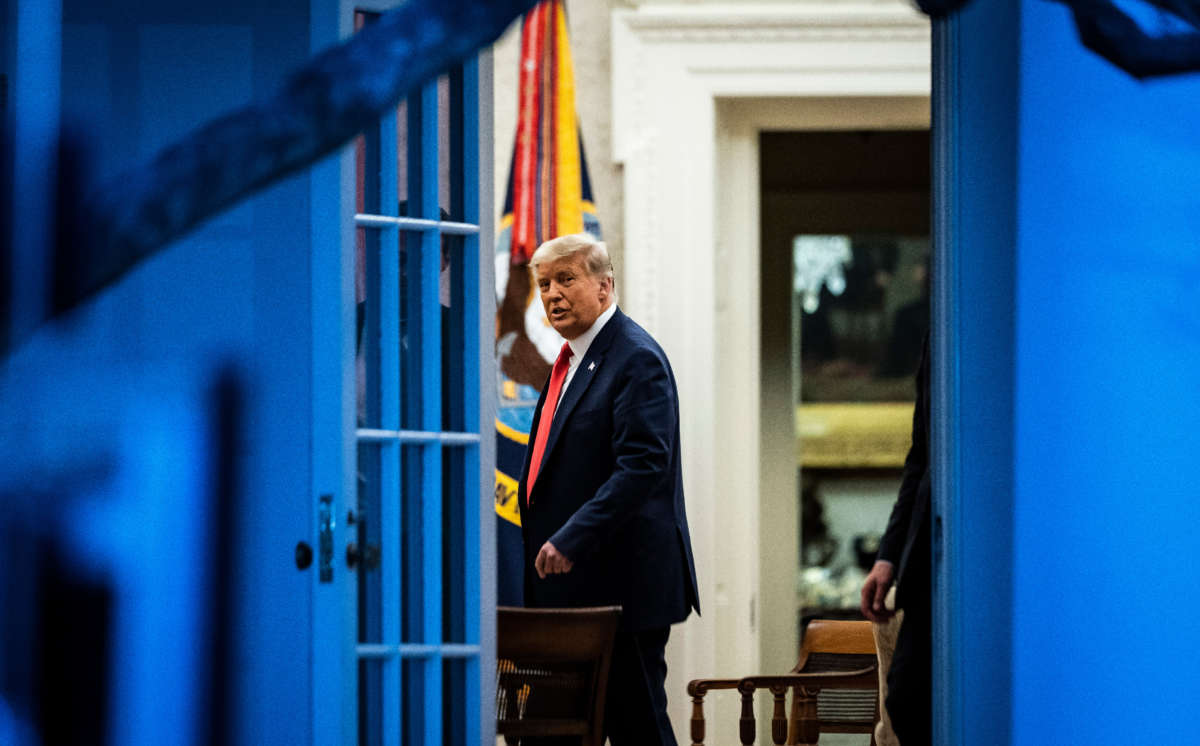A report released on Thursday by the Senate Judiciary Committee provides further insight into former President Donald Trump’s plot to overturn the 2020 presidential election — a plan which involved members of his administration and at least one member of Congress.
In a nearly 400 page document, the committee reveals that Trump called and met with senior Department of Justice (DOJ) leaders at least nine times in his attempts to pressure them into declaring the election “corrupt,” a move that the report calls a gross abuse of power.
“In attempting to enlist DOJ for personal, political purposes in an effort to maintain his hold on the White House, Trump grossly abused the power of the presidency,” reads one of the report’s key conclusions. “He also arguably violated the criminal provisions of the Hatch Act, which prevent any person — including the President — from commanding federal government employees to engage in political activity.”
The report, which is based on witness interviews with top DOJ officials, found that part of Trump’s strategy was putting repeated pressure on the DOJ in an attempt to get allies within the department.
After numerous conversations between then-acting Attorney General Jeffery Rosen and Trump officials like then-Chief of Staff Mark Meadows, Trump became frustrated with the results. “One thing we know is you, Rosen, aren’t going to do anything to overturn the election,” he said on January 3.
The former president then enlisted the help of DOJ lawyer Jeffrey Clark, a Trump ally who has peddled false election conspiracy theories, to help him oust Rosen. The plan — though it never came to fruition — was to replace Rosen with Clark just days before the certification of the election results on January 6.
It wasn’t just DOJ officials that Trump teamed up with, however. As first highlighted by Politico, Trump also enlisted the help of Rep. Scott Perry (R-Pennsylvania), a member of the far-right Freedom Caucus, to call DOJ officials with supposed evidence of fraud to make it seem like there was support from Congress to overturn the election. Perry also recommended that Clark be elevated within the Justice Department.
Perry wasn’t the only Freedom Caucus member who played a role in Trump’s plans; the report also details a call between Trump and Rosen on December 27, 2020, in which Trump highlighted officials who were helping him strategize on the election.
One of the officials he mentioned was Rep. Jim Jordan (R-Ohio), who attended a meeting on December 21, 2020, where Trump and House Freedom Caucus members strategized their plan for January 6. In the call, Trump also mentioned Perry, who helped lead objections to the certification of the election results in the House, and Sen. Doug Mastriano (R-Pennsylvania), who had spent thousands of dollars of campaign money on bus rentals to send people to Washington on January 6.
Rosen and Richard Donoghue, the DOJ’s second in command, told the Judiciary Committee that they remember pushing back against Trump, saying that the agency was simply doing its job and wouldn’t “just flip a switch and change the election.”
After DOJ officials learned of the plan to replace Rosen with Clark, Donoghue and two White House lawyers threatened to resign in a meeting with Trump, which appeared to get the president to retire the idea.
The report also details a litany of conspiratorial claims that Trump allies presented as supposed “proof” that the election was being stolen, even though there has never been any evidence to suggest that fraud took place. For instance, Meadows and other Trump sympathizers sent DOJ officials a number of false assertions about Dominion voting machines switching votes en masse from Trump to Biden.
Though the Judiciary Committee says that it’s too early in the investigation process to recommend potential criminal claims, Judiciary Chair Sen. Dick Durbin (D-Illinois) has asked the D.C. Bar to investigate Clark for potential misconduct.
Angry, shocked, overwhelmed? Take action: Support independent media.
We’ve borne witness to a chaotic first few months in Trump’s presidency.
Over the last months, each executive order has delivered shock and bewilderment — a core part of a strategy to make the right-wing turn feel inevitable and overwhelming. But, as organizer Sandra Avalos implored us to remember in Truthout last November, “Together, we are more powerful than Trump.”
Indeed, the Trump administration is pushing through executive orders, but — as we’ve reported at Truthout — many are in legal limbo and face court challenges from unions and civil rights groups. Efforts to quash anti-racist teaching and DEI programs are stalled by education faculty, staff, and students refusing to comply. And communities across the country are coming together to raise the alarm on ICE raids, inform neighbors of their civil rights, and protect each other in moving shows of solidarity.
It will be a long fight ahead. And as nonprofit movement media, Truthout plans to be there documenting and uplifting resistance.
As we undertake this life-sustaining work, we appeal for your support. Please, if you find value in what we do, join our community of sustainers by making a monthly or one-time gift.
